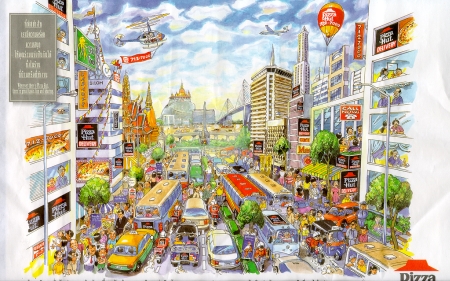Early last month I wrote about a Thai fairy tale in which a wise king encourages rural people to return from the city by granting their village the radiant “tree of sufficiency.” Well, in the real world things seem rather different. Today’s Bangkok Post carries this important story about Thailand’s fundamental demographic transition:
More than half of Thailand’s 63 million people now live in cities as a growing number of Thais trade in their ploughs for more urban pursuits, an urban planning professor said on Wednesday. The country’s urban population jumped to 50.9% in 2006, as officials expanded the definition of urban zones and counted unregistered residents, said Yongtanit Pimonsathean from Thammasat University. Dr Yongtanit added that Thailand’s urban culture has changed in recent years, with the population becoming older and more diverse. The number of foreign workers, for example, has doubled from 2002 to 2006 to 66,099. Nearly half are working in Bangkok. “The increasing number of foreign workers, especially the young urbanites, has brought about the awareness of the different way of life and living traditions,” he said.
At the launch of the report yesterday, the UN Population Fund (UNFPA) urged governments of developing nations in Asia to improve their policies on helping the growing urban poor. Garimella Giridhar, the UNFPA representative in Bangkok, said massive urban growth in Asian cities is imminent and unavoidable, and governments could do better than just trying to drive poor people out.
“It [the increase in urban poor] is not that bad. To take it as bad is a misconception,” he said. … The report warned that urbanisation, if unchecked, will breed pollution, crime, sexual diseases and other social problems. But it also suggested that governments try to view urbanisation as an opportunity. Cities create environmental problems but they can also create solutions, it said. Concentrating populations in cities can contribute to the long-term sustainability of a nation and its economy. It said no country in the industrial age has ever achieved significant economic growth without urbanisation.
The report suggested that governments accept the right of poor people to live in cities, provide good and affordable housing, adopt sustainable land use to minimise the ecological impact and join international efforts to support strategies for future urbanisation.
I wonder how much the advancement of the rural poor is constrained by an electoral registration system that sees a songkran-like exodus back to the villages on polling day. Are the political voices of the urban poor being fully heard in the urban places where they now pursue their livelihoods? Or we still stuck in a mindset that idealises the virtuous poor as a loyal peasantry living in bucolic villages?
The imaginary king’s sufficiency tree is unlikely to prove very attractive to the rural-urban migrants participating in Thailand’s demographic transformation. But it probably helps to nurture the nostalgia of those who would welcome a return to long past days.
 Facebook
Facebook  Twitter
Twitter  Soundcloud
Soundcloud  Youtube
Youtube  Rss
Rss 